安徽师范大学学科教学(英语)892英语教学论2011到2019九套考研真题
2019年安徽师范大学852翻译与写作考研真题

2019年安徽师范大学852翻译与写作考研真题(总分:150.00,做题时间:180分钟)一、Part Ⅰ Translation(总题数:4,分数:100.00)1.Translate the following passages into Chinese.Passage 1In a recent research article in Clinical Psychological Science, I and my collaborator, the neuroscientist Tom Johnstone at the University of Reading in the UK, examined the prevalence of absolutist thinking in the natural language of more than 6,400 online members in various mental-health chat groups. From the outset, we predicted that thosewith depression, anxiety and suicidal ideation would have a more absolutist outlook, and that this would manifest in their style of language. Compared with 19 different online control chat groups on topics from cancer to parenting, theprevalence of absolutist words was approximately 50 per cent greater in depression and anxiety groups,and approximately 80 per cent greater in the suicidal-ideation group.Previously, the best-known linguistic markers for mental-health disorders had been an excessive use offirst-person singular pronouns such as “me”, “myself” and “I”, with a reduced use of second- and third-person pronouns. This pattern of pronoun use reflects the isolation and self-focus common in depression; negative-emotion words are also reliable in identifying depression. However, we find that the prevalence of absolutist words is a better linguistic marker for mental-health disorders than both pronouns and negative-emotion words. They produced bigger differences between groups with mental-health disorders and control groups compared with pronouns, and they tracked groups with mental-health disorders better than negative-emotion words. Paradoxically, negative-emotion words were more prevalent in anxiety and depression groups than in the suicidal-ideation group.(分数:25.00)__________________________________________________________________________________________2.Translate the following passages into Chinese.Passage 2You are stressed and exhausted, and you are not alone. Parenting today often feels like a frantic race in which we are forever a few steps behind. Kids today have half as much free time as they did 30 years ago, notes a national studyof 3,500 children aged 12 and under released by the University of Michigan Institute for Social Research. “Children are affected by the same time crunch as their parents,” says Sandra L. Hofferth, a senior research scientist at the institute.“As a society, we have talked ourselves into believing that we have to make every moment count, and that we have to fill our children as we would fill empty vessels,” says Dr. Kathy Hirsh-Pasek, a professor at Temple Universityin Philadelphia. “Parents feel compelled to give their kids every advantage they can afford. So they cram their days with art,music, sports, and even weekend enrichment programs.” Is it any wonder that when youngsters have a free moment, they complain that they‟re bored? More likely, they simply don‟t know what to do with themselves. “There is a myth that doing nothing is wasting time, when it‟s actually extremely productive and essential,” saysDr. Hirsh-Pasek. “During empty hours, kids explore the world at their own pace, develop their own unique set of interests and indulge in the sort of fantasy play that will help them figure out how to create their own happiness, handle problems with others on their own, and sensibly manage their own time. That‟s a critical life skill.”(分数:25.00)__________________________________________________________________________________________3.Translate the following passages into English.Passage 1今年以来,中国经济运行总体平稳,经济增速在全球主要经济体中是比较高的,就业、物价都比较稳定。
2011英语真题与答案解析
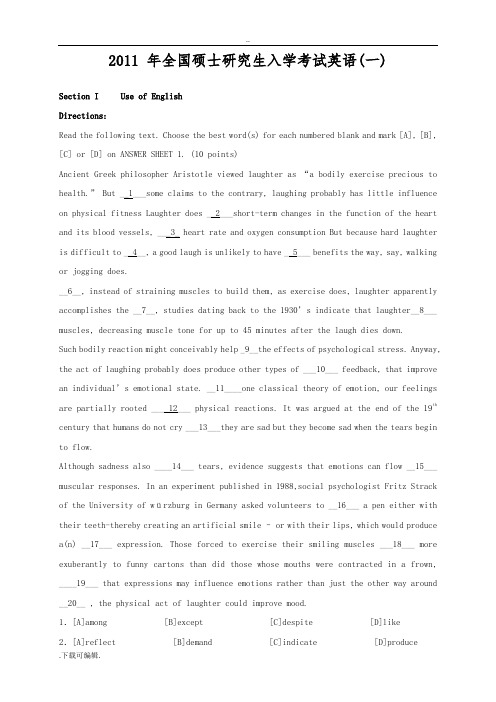
2011 年全国硕士研究生入学考试英语(一)Section I Use of EnglishDirections:Read the following text. Choose the best word(s) for each numbered blank and mark [A], [B], [C] or [D] on ANSWER SHEET 1. (10 points)Ancient Greek philosopher Aristotle viewed laughter as “a bodily exercise precious to health.” But __1___some claims to the contrary, laughing probably has little influence on physical fitness Laughter does __2___short-term changes in the function of the heart and its blood vessels, ___3_ heart rate and oxygen consumption But because hard laughter is difficult to __4__, a good laugh is unlikely to have __5___ benefits the way, say, walking or jogging does.__6__, instead of straining muscles to build them, as exercise does, laughter apparently accomplishes the __7__, studies dating back to the 1930’s indicate that laughter__8___ muscles, decreasing muscle tone for up to 45 minutes after the laugh dies down.Such bodily reaction might conceivably help _9__the effects of psychological stress. Anyway, the act of laughing probably does produce other types of ___10___ feedback, that improve an individual’s emotional state. __11____one classical theory of emotion, our feelings are partially rooted ____12___ physical reactions. It was argued at the end of the 19th century that humans do not cry ___13___they are sad but they become sad when the tears begin to flow.Although sadness also ____14___ tears, evidence suggests that emotions can flow __15___ muscular responses. In an experiment published in 1988,social psychologist Fritz Strack of the University of würzburg in Germany asked volunteers to __16___ a pen either with their teeth-thereby creating an artificial smile –or with their lips, which would produce a(n) __17___ expression. Those forced to exercise their smiling muscles ___18___ more exuberantly to funny cartons than did those whose mouths were contracted in a frown, ____19___ that expressions may influence emotions rather than just the other way around __20__ , the physical act of laughter could improve mood.1.[A]among [B]except [C]despite [D]like2.[A]reflect [B]demand [C]indicate [D]produce3.[A]stabilizing [B]boosting [C]impairing [D]determining 4.[A]transmit [B]sustain [C]evaluate [D]observe 5.[A]measurable [B]manageable [C]affordable [D]renewable6.[A]In turn [B]In fact [C]In addition [D]In brief 7.[A]opposite [B]impossible [C]average [D]expected 8.[A]hardens [B]weakens [C]tightens [D]relaxes 9.[A]aggravate [B]generate [C]moderate [D]enhance 10.[A]physical [B]mental [C]subconscious [D]internal 11.[A]Except for [B]According to [C]Due to [D]As for12.[A]with [B]on [C]in [D]at 13.[A]unless [B]until [C]if [D]because 14.[A]exhausts [B]follows [C]precedes [D]suppresses 15.[A]into [B]from [C]towards [D]beyond 16.[A]fetch [B]bite [C]pick [D]hold 17.[A]disappointed [B]excited [C]joyful [D]indifferent 18.[A]adapted [B]catered [C]turned [D]reacted 19.[A]suggesting [B]requiring [C]mentioning [D]supposing20.[A]Eventually [B]Consequently [C]Similarly [D]ConverselySection II Reading ComprehensionPart ADirections:Read the following four texts. Answer the questions below each text by choosing [A], [B], [C] or [D]. Mark your answers on ANSWER SHEET 1. (40 points)Text 1The decision of the New York Philharmonic to hire Alan Gilbert as its next music director has been the talk of the classical-music world ever since the sudden announcement of his appointment in 2009. For the most part, the response has been favorable, to say the least. “Hooray! At last!” wrote Ant hony Tommasini, a sober-sided classical-music critic. One of the reasons why the appointment came as such a surprise, however, is that Gilbert is comparatively little known. Even Tommasini, who had advocated Gilbert’s appointmentin the Times, calls him “a n unpretentious musician with no air of the formidable conductor about him.” As a description of the next music director of an orchestra that has hitherto been led by musicians like Gustav Mahler and Pierre Boulez, that seems likely to have struck at least some Times readers as faint praise.For my part, I have no idea whether Gilbert is a great conductor or even a good one. To be sure, he performs an impressive variety of interesting compositions, but it is not necessary for me to visit Avery Fisher Hall, or anywhere else, to hear interesting orchestral music. All I have to do is to go to my CD shelf, or boot up my computer and download still more recorded music from iTunes.Devoted concertgoers who reply that recordings are no substitute for live performance are missing the point. For the time, attention, and money of the art-loving public, classical instrumentalists must compete not only with opera houses, dance troupes, theater companies, and museums, but also with the recorded performances of the great classical musicians of the 20th century. There recordings are cheap, available everywhere, and very often much higher in artistic quality than today’s live performances; moreover, they can be “consumed” at a time and place of the listener’s choosing. The wi despread availability of such recordings has thus brought about a crisis in the institution of the traditional classical concert.One possible response is for classical performers to program attractive new music that is not yet available on record. Gilbert’s own interest in new music has been widely noted: Alex Ross, a classical-music critic, has described him as a man who is capable of turning the Philharmonic into “a markedly different, more vibrant organization.” But what will be the nature of that diffe rence? Merely expanding the orchestra’s repertoire will not be enough. If Gilbert and the Philharmonic are to succeed, they must first change the relationship between America’s oldest orchestra and the new audience it hops to attract.21. We learn from Par a.1 that Gilbert’s appointment has[A]incurred criticism.[B]raised suspicion.[C]received acclaim.[D]aroused curiosity.22. Tommasini regards Gilbert as an artist who is[A]influential.[B]modest.[C]respectable.[D]talented.23. The author believes that the devoted concertgoers[A]ignore the expenses of live performances.[B]reject most kinds of recorded performances.[C]exaggerate the variety of live performances.[D]overestimate the value of live performances.24. According to the text, which of the following is true of recordings?[A]They are often inferior to live concerts in quality.[B]They are easily accessible to the general public.[C]They help improve the quality of music.[D]They have only covered masterpieces.25. Regarding Gilbert’s role in r evitalizing the Philharmonic, the author feels[A]doubtful.[B]enthusiastic.[C]confident.[D]puzzled.Text 2When Liam McGee departed as president of Bank of America in August, his explanation was surprisingly straight up. Rather than cloaking his exit in the usual vague excuses, he came right out and said he was leaving “to pursue my goal of running a company.” Broadcasting his ambition was “very much my decision,” McGee says. Within two weeks, he was talking for the first time with the board of Hartford Financial Services Group, which named him CEO and chairman on September 29.McGee says leaving without a position lined up gave him time to reflect on what kind of company he wanted to run. It also sent a clear message to the outside world about his aspira tions. And McGee isn’t alone. In recent weeks the No.2 executives at Avon and American Express quit with the explanation that they were looking for a CEO post. As boards scrutinize succession plans in response to shareholder pressure, executives who don’t get the nodalso may wish to move on. A turbulent business environment also has senior managers cautious of letting vague pronouncements cloud their reputations.As the first signs of recovery begin to take hold, deputy chiefs may be more willing to make the jump without a net. In the third quarter, CEO turnover was down 23% from a year ago as nervous boards stuck with the leaders they had, according to Liberum Research. As the economy picks up, opportunities will abound for aspiring leaders.The decision to quit a senior position to look for a better one is unconventional. For years executives and headhunters have adhered to the rule that the most attractive CEO candidates are the ones who must be poached. Says Korn/Ferry senior partner Dennis Carey:”I can’t think of a single search I’ve done where a board has not instructed me to look at sitting CEOs first.”Those who jumped without a job haven’t always landed in top positions quickly. Ellen Marram quit as chief of Tropicana a decade age, saying she wanted to be a CEO. It was a year before she became head of a tiny Internet-based commodities exchange. Robert Willumstad left Citigroup in 2005 with ambitions to be a CEO. He finally took that post at a major financial institution three years later.Many recruiters say the old disgrace is fading for top performers. The financial crisis has made it more acceptable to be between jobs or to leave a bad one. “The traditional rule was it’s safer to stay where you are, but that’s been fundamentally inverted,” says one headhunter. “The people who’ve been hurt the worst are those who’ve stayed too long.”26.When McGee announced his departure, his manner can best be described as being[A]arrogant.[B]frank.[C]self-centered.[D]impulsive.27. According to Paragraph 2, senior executives’ quitting may be spurred by[A]their expectation of better financial status.[B]their need to reflect on their private life.[C]their strained relations with the boards.[D]their pursuit of new career goals.28.The word “poached” (Line 3, Paragraph 4) most probably means[A]approved of.[B]attended to.[C]hunted for.[D]guarded against.29.It can be inferred from the last paragraph that[A]top performers used to cling to their posts.[B]loyalty of top performers is getting out-dated.[C]top performers care more about reputations.[D]it’s safer to stick to the traditional rules.30. Which of the following is the best title for the text?[A]CEOs: Where to Go?[B]CEOs: All the Way Up?[C]Top Managers Jump without a Net[D]The Only Way Out for Top PerformersText 3The rough guide to marketing success used to be that you got what you paid for. No longer. While traditional “paid” media –such as television commercials and print advertisements – still play a major role, companies today can exploit many alternative forms of media. Consumers passionate about a product may create “owned” media by sending e-mail alerts about products and sales to customers registered with its Web site. The way consumers now approach the broad range of factors beyond conventional paid media.Paid and owned media are controlled by marketers promoting their own products. For earned media , such marketers act as the initiator for users’ responses. But in some cases, one marketer’s owned media become another marketer’s paid media – for instance, when an e-commerce retailer sells ad space on its Web site. We define such sold media as owned media whose traffic is so strong that other organizations place their content or e-commerce engines within that environment. This trend ,which we believe is still in its infancy, effectively began with retailers and travel providers such as airlines and hotels and will no doubt go further. Johnson & Johnson, for example, has created BabyCenter, a stand-alone media property that promotes complementary and even competitive products. Besidesgenerating income, the presence of other marketers makes the site seem objective, gives companies opportunities to learn valuable information about the appeal of other companies’ marketing, and may help expand user traffic for all companies concerned.The same dramatic technological changes that have provided marketers with more (and more diverse) communications choices have also increased the risk that passionate consumers will voice their opinions in quicker, more visible, and much more damaging ways. Such hijacked media are the opposite of earned media: an asset or campaign becomes hostage to consumers, other stakeholders, or activists who make negative allegations about a brand or product. Members of social networks, for instance, are learning that they can hijack media to apply pressure on the businesses that originally created them.If that happens, passionate consumers would try to persuade others to boycott products, putting the reputation of the target company at risk. In such a case, the company’s response may not be sufficiently quick or thoughtful, and the learning curve has been steep. Toyota Motor, for example, alleviated some of the damage from its recall crisis earlier this year with a relatively quick and well-orchestrated social-media response campaign, which included efforts to engage with consumers directly on sites such as Twitter and the social-news site Digg.31.Consumers may create “earned” media when they are[A] obscssed with online shopping at certain Web sites.[B] inspired by product-promoting e-mails sent to them.[C] eager to help their friends promote quality products.[D] enthusiastic about recommending their favorite products.32. According to Paragraph 2,sold media feature[A] a safe business environment.[B] random competition.[C] strong user traffic.[D] flexibility in organization.33. The author indicates in Paragraph 3 that earned media[A] invite constant conflicts with passionate consumers.[B] can be used to produce negative effects in marketing.[C] may be responsible for fiercer competition.[D] deserve all the negative comments about them.34. Toyota Motor’s experience is cited as an example of[A] responding effectively to hijacked media.[B] persuading customers into boycotting products.[C] cooperating with supportive consumers.[D] taking advantage of hijacked media.35. Which of the following is the text mainly about ?[A] Alternatives to conventional paid media.[B] Conflict between hijacked and earned media.[C] Dominance of hijacked media.[D] Popularity of owned media.Text 4It’s no surprise that Jennifer Senior’s insightful, provocative magazine cover story, “I love My Children, I Hate My Life,” is arousing much chatter – nothing gets people talking like the suggestion that child rearing is anything less than a completely fulfilling, life-enriching experience. Rather than concluding that children make parents either happy or miserable, Senior suggests we need to redefine happiness: instead of thinking of it as something that can be measured by moment-to-moment joy, we should consider being happy as a past-tense condition. Even though the day-to-day experience of raising kids can be soul-crushingly hard, Senior writes that “the very things that in the moment dampe n our moods can later be sources of intense gratification and delight.”The magazine cover showing an attractive mother holding a cute baby is hardly the only Madonna-and-child image on newsstands this week. There are also stories about newly adoptive – and newly single –mom Sandra Bullock, as well as the usual “Jennifer Aniston is pregnant” news. Practically every week features at least one celebrity mom, or mom-to-be, smiling on the newsstands.In a society that so persistently celebrates procreation, is it any wonder that admitting you regret having children is equivalent to admitting you support kitten-killing ? It doesn’t seem quite fair, then, to compare the regrets of parents to the regrets of the children. Unhappy parents rarely are provoked to wond er if they shouldn’t have had kids, but unhappy childless folks are bothered with the message that children are the single mostimportant thing in the world: obviously their misery must be a direct result of the gaping baby-size holes in their lives.Of course, the image of parenthood that celebrity magazines like Us Weekly and People present is hugely unrealistic, especially when the parents are single mothers like Bullock. According to several studies concluding that parents are less happy than childless couples, single parents are the least happy of all. No shock there, considering how much work it is to raise a kid without a partner to lean on; yet to hear Sandra and Britney tell it, raising a kid on their “own” (read: with round-the-clock help) is a piece of cake. It’s hard to imagine that many people are dumb enough to want children just because Reese and Angelina make it look so glamorous: most adults understand that a baby is not a haircut. But it’s interesting to wonder if the images we see every wee k of stress-free, happiness-enhancing parenthood aren’t in some small, subconscious way contributing to our own dissatisfactions with the actual experience, in the same way that a small part of us hoped getting “ the Rachel” might make us look just a littl e bit like Jennifer Aniston.36.Jennifer Senior suggests in her article that raising a child can bring[A]temporary delight[B]enjoyment in progress[C]happiness in retrospect[D]lasting reward37.We learn from Paragraph 2 that[A]celebrity moms are a permanent source for gossip.[B]single mothers with babies deserve greater attention.[C]news about pregnant celebrities is entertaining.[D]having children is highly valued by the public.38.It is suggested in Paragraph 3 that childless folks[A]are constantly exposed to criticism.[B]are largely ignored by the media.[C]fail to fulfill their social responsibilities.[D]are less likely to be satisfied with their life.39.According to Paragraph 4, the message conveyed by celebrity magazines is[A]soothing.[B]ambiguous.[C]compensatory.[D]misleading.40.Which of the following can be inferred from the last paragraph?[A]Having children contributes little to the glamour of celebrity moms.[B]Celebrity moms have influenced our attitude towards child rearing.[C]Having children intensifies our dissatisfaction with life.[D]We sometimes neglect the happiness from child rearing.Part BDirections:The following paragraph are given in a wrong order. For Questions 41-45, you are required to reorganize these paragraphs into a coherent text by choosing from the list A-G to filling them into the numbered boxes. Paragraphs E and G have been correctly placed. Mark your answers on ANSWER SHEET 1. (10 points)[A] No disciplines have seized on professionalism with as much enthusiasm as the humanities. You can, Mr Menand points out, became a lawyer in three years and a medical doctor in four. But the regular time it takes to get a doctoral degree in the humanities is nine years. Not surprisingly, up to half of all doctoral students in English drop out before getting their degrees.[B] His concern is mainly with the humanities: Literature, languages, philosophy and so on. These are disciplines that are going out of style: 22% of American college graduates now major in business compared with only 2% in history and 4% in English. However, many leading American universities want their undergraduates to have a grounding in the basic canon of ideas that every educated person should posses. But most find it difficult to agree on what a “general education” should look like. At Harvard, Mr Menand notes, “the great books are read because they have been read”-they form a sort of social glue.[C] Equally unsurprisingly, only about half end up with professorships for which they entered graduate school. There are simply too few posts. This is partly because universities continue to produce ever more PhDs. But fewer students want to study humanities subjects: English departments awarded more bachelor’s degrees in 1970-71 than they did 20 years later.Fewer students requires fewer teachers. So, at the end of a decade of theses-writing, many humanities students leave the profession to do something for which they have not been trained.[D] One reason why it is hard to design and teach such courses is that they can cut across the insistence by top American universities that liberal-arts educations and professional education should be kept separate, taught in different schools. Many students experience both varieties. Although more than half of Harvard undergraduates end up in law, medicine or business, future doctors and lawyers must study a non-specialist liberal-arts degree before embarking on a professional qualification.[E] Besides professionalizing the professions by this separation, top American universities have professionalised the professor. The growth in public money for academic research has speeded the process: federal research grants rose fourfold between 1960and 1990, but faculty teaching hours fell by half as research took its toll. Professionalism has turned the acquisition of a doctoral degree into a prerequisite for a successful academic career: as late as 1969a third of American professors did not possess one. But the key idea behind professionalisation, argues Mr Menand, is that “the kn owledge and skills needed for a particular specialization are transmissible but not transferable.”So disciplines acquire a monopoly not just over the production of knowledge, but also over the production of the producers of knowledge.[F] The key to reforming higher education, concludes Mr Menand, is to alter the way in which “the producers of knowledge are produced.”Otherwise, academics will continue to think dangerously alike, increasingly detached from the societies which they study, investigate and crit icize.”Academic inquiry, at least in some fields, may need to become less exclusionary and more holistic.”Yet quite how that happens, Mr Menand dose not say. [G] The subtle and intelligent little book T he Marketplace of Ideas: Reform and Resistance in the American University should be read by every student thinking of applying to take a doctoral degree. They may then decide to go elsewhere. For something curious has been happening in American Universities, and Louis Menand, a professor of English at Harvard University, captured it skillfully.Part CDirections:Read the following text carefully and then translate the underlined segments into Chinese. Your translation should be written carefully on ANSWER SHEET 2. (10 points)With its theme that “Mind is the master weaver,” creating our inner character and outer circumstances, the book As a Man Thinking by James Allen is an in-depth exploration of the central idea of self-help writing.(46) Allen’s contribution was to take an assumption we all share-that because we are not robots we therefore control our thoughts-and reveal its erroneous nature.Because most of us believe that mind is separate from matter, we think that thoughts can be hidden and made powerless; this allows us to think one way and act another. However, Allen believed that the unconscious mind generates as much action as the conscious mind, and (47) while we may be able to sustain the illusion of control through the conscious mind alone, in reality we are continually faced with a question: “Why cannot I make myself do this or achieve that? ”Since desire and will are damaged by the presence of thoughts that do not accord with desire, Allen concluded : “ We do not attract what we want, but what we are.” Achievement happens because you as a person embody the external achievement; you don’t “ get” success but become it. There is no gap between mind and matter.\Part of the fame of Allen’s book is its contention that “Circumstances do not make a person, they reveal him.”(48) This seems a justification for neglect of those in need, and a rationalization of exploitation, of the superiority of those at the top and the inferiority of those at the bottom.This ,however, would be a knee-jerk reaction to a subtle argument. Each set of circumstances, however bad, offers a unique opportunity for growth. If circumstances always determined the life and prospects of people, then humanity would never have progressed. In fat, (49)circumstances seem to be designed to bring out the best in us and if we feel that we have been “wronged” then we are unlikely to begin a conscious effort to escape from our situation .Nevertheless, as any biographer knows, a person’s early life and its conditions are often the greatest gift to an individual.The sobering aspect of Alle n’s book is that we have no one else to blame for our present condition except ourselves. (50) The upside is the possibilities contained in knowing that everything is up to us; where before we were experts in the array of limitations, now we become authorities of what is possible.Section Ⅲ WritingPart A51.Directions:Write a letter to a friend of yours to1) recommend one of your favorite movies and 2) give reasons for your recommendation Your should write about 100 words on ANSWER SHEET 2Do not sign your own name at the end of the leter. User“LI MING” instead.Do not writer the address.(10 points)Part B52. Directions:Write an essay of 160---200 words based on the following drawing. In your essay, you should1)describe the drawing briefly,2)explai n it’s intended meaning, and3)give your comments.Your should write neatly on ANSWER SHEET 2. (20 points)旅程之“余”2011年考研英语一真题答案及详解Section I Use of English1-5 CDBBA 6-10 BADCA 11-15 BCDCB 16-20 DADAC1.C解析:语义逻辑题。
安徽师范大学2019年硕士研究生招生考试自命题试卷真题-英语教学论
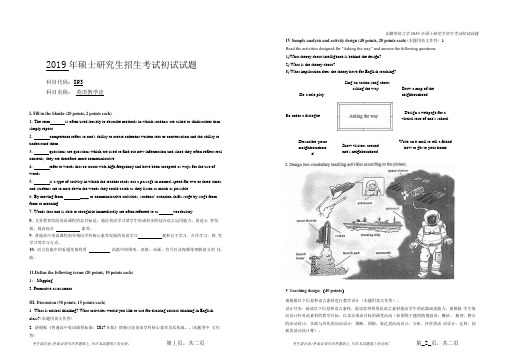
安徽师范大学2019年硕士研究生招生考试初试试题2019年硕士研究生招生考试初试试题科目代码:893科目名称:英语教学论IV Sample analysis and activity design (40 points, 20 points each)(本题用英文作答) 1. Read the activities designed fbr "Asking the way” and answer the following questions.1)What theory about intelligence is behind the design?2)What is the theory about?3)What implication does the theory have fbr English teaching?Sing an action song aboutasking the wayDo a role playDraw a map of theneighbourhoodL Fill in the blanks (20 points, 2 points each)1.The term is often used loosely to describe methods in which students are asked to think rather than simpiy repeat.petence refers to one's ability to create coherent written text or conversation and the ability to understand them.3.questions are questions which are used to find out new information and since they often reflect real contexts, they are therefore more communicative.4.refer to words that co-occur with high frequency and have been accepted as ways for the use of words.5.is a type of activity in which the teacher reads out a passage in normal speed fbr two or three times and students are to note down the words they could catch as they listen as much as possible.6.By moving from ____ to communicative activities, students' attention shifts stage by stage from form to meaning.7.Words that one is able to recognize immediately are often referred to as vocabulary.8.义务教育阶段英语课程的总目标是:通过英语学习使学生形成初步的综合语言运用能力,促进心智发展,提高综合素养。
2011年安师大考研书目
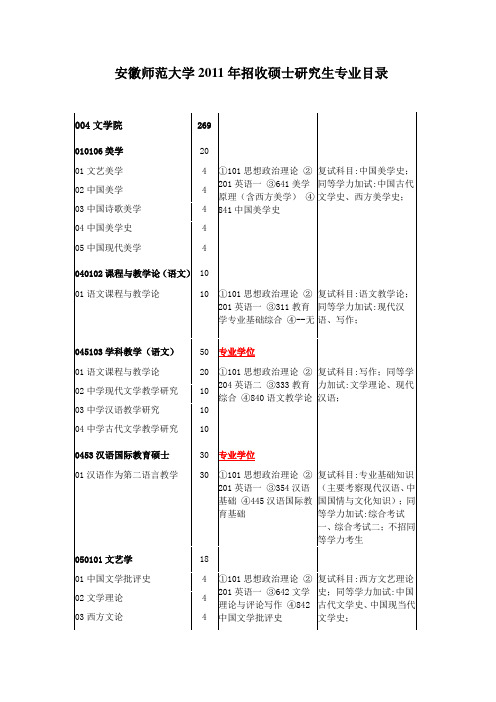
3
0320世纪中俄文学比较研究
3
050401艺术学(文学院)
8
01艺术理论与批评
8
①101思想政治理论 ②201英语一 ③649艺术理论 ④849艺术评论(写作)
复试科目:美学基本原理;同等学力加试:中国艺术史、西方艺术史;艺术评论(写作)可参阅相关艺术理论类杂志。
安徽师范大学2011年招收硕士研究生专业目录
004文学院
269
010106美学
20
01文艺美学
4
①101思想政治理论 ②201英语一 ③641美学原理(含西方美学) ④841中国美学史
复试科目:中国美学史;同等学力加试:中国古代文学史、西方美学史;
02中国美学
4
03中国诗歌美学
4
04中国美学史
4
05中国现代美学
4
040102课程与教学论(语文)
10
01语文课程与教学论
10
①101思想政治理论 ②201英语一 ③311教育学专业基础综合 ④--无
复试科目:语文教学论;同等学力加试:现代汉语、写作;
045103学科教学(语文)
50
专业学位
01语文课程与教学论
20
①101思想政治理论 ②204英语二 ③333教育综合 ④840语文教学论
复试科目:汉语知识;同等学力加试:中国古代文学、中国现当代文学;
02汉语史
14
050104中国古典文献学
5
01文学文献学
2
①101思想政治理论 ②201英语一 ③642文学理论与评论写作 ④844中国古典文献学
复试科目:中国古代文学;同等学力加试:古代汉语、中国历代文学作品选;
安徽师范大学2010-2019年333教育综合考研真题硕士研究生入学考试试题
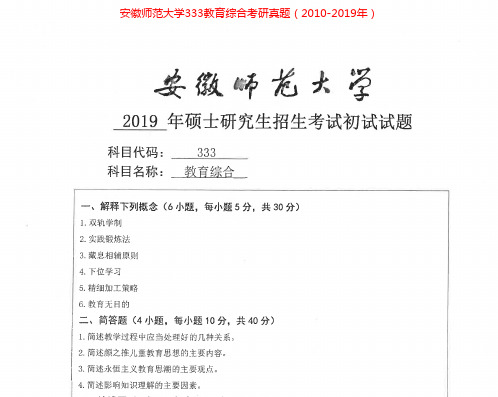
一、名词解释题 1 美育 2 学校管理目标 3 要素主义 4 课程标准 5 教学模式 6 最近发展区
二、简答题 1 简述杜威关于教育的本质与目的的观点。 2 简述卢梭的自由教育理论及其影响。 3 为什么说德育过程是培养学生知情意行的过程? 4 简述中共革命根据地和解放区教育基本经验。 5 简述世界各国课程改革的总趋势。 6 简要分析社会规范学习的心理过程。
三、论述题 1 评述黄炎培的职业教育思想和当代意义。 2 我国基本教育改革是如何体现以人为本的? 3 评述班杜拉观察学习理论和意义。
“今天没有发现一个学生有作弊行为。”“联络员”宣告。
1/10
2011 年安徽师范大学 333 教育综合考研真题
一、名词解释题 1《大教学论》 2 内发论 3 高等教育大众化 4 癸卯学制 5 个人本位论 6 义务教育
二、简答题 1 简述学校教育在人的身心发展中的作用。 2 简述“六艺”教育的内容和特征。 3 试比较欧洲的新教育运动和美国的进步教育运动。 4 简析学生品德不良产生的原因及其矫正。
区)1200 多名学子的这次考试却与众不同考场里,答题、检查、交卷、离开······考试的一切过 程都在没有老师的。监视。下静悄悄地完成。
上月 30 日下午,期中考试进入最后一门地理。3 时 20 余,喧闹的校园渐渐安静下来,老师走进课 室,说明考试事项后便开始发放试卷,10 分钟后老师离开了教室。下午 3 时 30 分,考试作声响起,考 试开始。考场外走廊两端各坐着一名“联络员”老师。4 时,“联络员”作第一次考场巡视,再过半小 时,一“联络员"作第二次考场巡视,他们的作用是为考生解决要上厕所和突然没有笔等难题。
安徽师范大学333教育综合考研真题(2010-2019年)
安徽师范大学考研参考书目真题笔记习题

综合俄语
1.《大学俄语》(1-7册),史铁强,外语教学与研究出版社,2010年。
662
中西音乐史
包含中国音乐史、西方音乐史。具体参考书目:
1、《中国古代音乐史简编》,夏野,上海音乐出版社;
2、《中国近现代音乐史》,汪毓和,人民音乐出版社;
3、《西方音乐通史》,于润洋,上海音乐出版社。
663
舞蹈教育学
2、《分析化学》(下册),华中师范大学等编,第四版,高教出版社。
713
有机化学
1、《有机化学》,李景宁,第五版,高教出版社,2011年版;
2、《有机化学》,胡宏纹,第三版,高教出版社,2006年版。
722
人文地理学
1、《人文地理学》,赵荣、王恩涌主编,第二版,高等教育出版社,2006年。
724
高等数学II
703
应用光学
1、《应用光学》,安连生,北京理工大学出版社。
705
模拟电子技术基础
1、《模拟电子技术基础》,童诗白、华成英主编,高等教育出版社。
711
无机化学
1、《无机化学》,宋天佑、程鹏、王杏乔、徐家宁,第三版,出版社高等教育出版社,2015年6月。
712
分析化学(含仪器分析)
1、《分析化学》,武汉大学主编,第六版,高教出版社;
安徽师范大学考研参考书目真题笔记习题
据安徽师范大学研招办消息,2020年安徽师范大学硕士研究生招生考试参考书目已发布,详情如下:
科目代码
科目名称
参考书目
211
翻译硕士英语
1、《翻译硕士英语》,周琼,黄敏主编,武汉大学出版社,2016年;
2、英语专业八)
1、《俄语入门》(上下册),外语教学与研究出版社,2017年。
2011年考研英语真题答案及解析
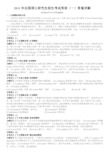
2011年全国硕士研究生招生考试英语(一)答案详解Section I Use of English一、文章题材结构分析文章出自2009年4月的《科学美国人》(Scientific American),作者Steve Ayan,原文题目为How Humor Makes You Friendlier,Sexier:幽默如何使你更加有人缘且性感。
文章主要探讨了笑的作用以及情感和肌肉反应之间的相互关系。
第一段由古希腊哲学家亚里士多德的观点引出“笑是有益于健康的身体运动”。
第二、三段承接上文,阐述了笑能放松肌肉,从而帮助减轻心理紧张的程度。
第四段以在1988年公布的一项实验为例论证了情绪是肌肉反应的结果,笑这一行为可以使心情好转。
二、试题解析1.[A]among在……之中[B]except除了[C]despite尽管[D]like像,如同【答案】[C]【考点】上下文逻辑关系+介词辨析【解析】第一段第一句意思是:古希腊哲学家亚里士多德把笑看作是“有益于健康的身体运动”,由连词but可知,第二句与第一句形成语义转折,即一些人提出相反的观点:笑不利于身体健康。
第二句逗号之后又提出:笑可能对身体健康几乎没有影响,这是对前两种观点的否定,由此判断第二句的句内逻辑是转折关系,[A]、[B]、[C]、[D]四个选项中只有[C]despite“尽管”表示转折,所以是正确答案。
2.[A]reflect反映[B]demand要求[C]indicate表明,预示[D]produce产生,引起【答案】[D]【考点】上下文语义衔接+动词辨析【解析】上下文语境是“笑确实能对心血管功能短期的改变”,具体说明笑对身体产生的影响。
所选动词要与后面的changes构成动宾关系,并且带有“发生……作用,产生……效果”的含义。
四个选项中[A]reflect“反映”,[B]demand“要求”,[C]indicate“表明,暗示”,[D]produce“产生”,只有[D]选项“产生、引起”符合本句语境,所以是正确答案。
安师大学科英语专业课二真题和答案

安师大学科英语专业课二真题和答案第1题单选题阅读选择Tom,a near-sighted young man,went on a blind date with a girl.The two were satisfied with each other.And they exchanged their telephone numbers.What can we learn about Tom?A,Tom made a good impression on the girl at first.B.It was the first time that Tom had dated a girl.C.Tom was blind.D.Tom was handsome and popular with the girls.正确答案A第2题单选题概括大意If you are tired of making vague excuses for another dull summer at home,here is a thought to lift your spirits.You do not need anything so radical as winning a lottery to finance a trip to Europe.A student identity card that can be obtained for a few dollars from the Council on International Educational Exchange entitles you to discount ticket son certain charter flights to London and Paris,as well as reduced admission to manymuseums,cinemas,and musical events.Once in Europe,you can stay at approved youth hostels for about two dollars a night.So don't give up your hopes of becoming an international traveler.The main idea of this paragraph isA.It is easy for a student to travel in Europe during the summer.B、The student needs to obtain an identity card to travel at a cheap rate.C.The student could stay at approved youth hostels for about two dollars a night.D.The students will become international travelers in summer.正确答案A。
